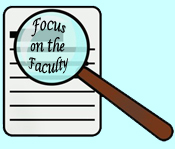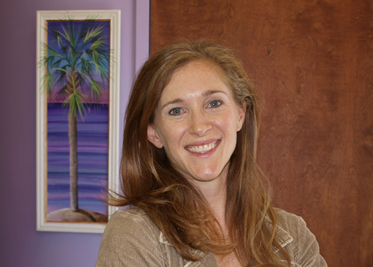Department of Communication


Communication professor Dr. Merissa Ferrara says her interest in interpersonal communication began as an undergraduate at Marquette University. After seeing her roommate continually get back together with an abusive boyfriend, she wanted to better understand the nature of interpersonal relationships. Her curiosity about human nature also led her to earn a degree in exercise science, so that she could investigate health issues and effectively reach people with health messages.
After earning a doctorate in communications from Michigan StateUniversity, Ferrara and her husband moved to Charleston. "College of Charleston brought me here. I was drawn to the small classes and intelligent students," she says. "The pace of Charleston and its people reminded me of New Orleans, where I grew up, and nice weather plus a beach are icing on the cake."
She has been a highly valued professor at the College for five years now, and she is best known for her courses in interpersonal and gender communications.
Much of Ferrara's research focuses on interpersonal issues that relate to her courses. Her research has covered an array of subjects, including complaining behaviors, family secrets, complimenting on Facebook, and navigating through relationships with exes. She describes this research as largely student driven. "Because I teach interpersonal classes, I do a lot of surveys and incorporation of the material into those classes,"
she says.
Her research also reflects her interest in health communication. Previous studies on effective health campaigns have taken Ferrara to Namibia, Africa. While there, she looked at condom use among teenagers and young adults, as well as a campaign for drugs preventing the transfer of HIV from mother to child. Ferrara found that cultural norms and circumstances were overlooked during the campaign's development and were causing the campaign to fail. This campaign, and research associated with it, is used by Ferrara in her theory courses to discuss important concepts for effective health messages.
The knowledge she gained from her research in Africa has also helped her with her current research regarding the use of sunglasses in Guatemala. After seeing a large number of cornea surgeries caused by sun damage, Ferrara's father, a surgeon, enlisted her help to create a health message that is sensitive to the culture and that promotes the use of sunglasses.
Her current research also includes two articles on obesity trends that are currently up for review. The study looks at the success of obesity programs. It also looks at the effects of women's Body Mass Index on their perceptions of other women and the effects of family communication styles on Body Mass Index. The publication of her study is exciting to Ferrara because she looks forward to seeing her research completed.
Ferrara is undecided about future research topics, but she knows that she would like to conduct an experimental study. "Most of my research has been largely survey and observation, but I would like to set up an experiment. I have a few ideas in the works, but I haven't made a final decision about what to study just yet,"she says.
With all of her teaching and research, it is a wonder that Ferrara manages to balance it all. "It's important to keep the perspective that it all gets done. Plus, it helps to know that everything can become examples for class," she says.
This upbeat and innovative attitude has helped make Ferrara a valuable professor at the College. When asked what her favorite thing about being a professor, Ferrara exclaimed: "Hands down, the best thing is the freedom to change your courses every semester. College is all about finding out who you are. I like to give projects that make students think about their lives, and I can change those projects around if one isn't working. Being a part of that exploration is exciting."
###